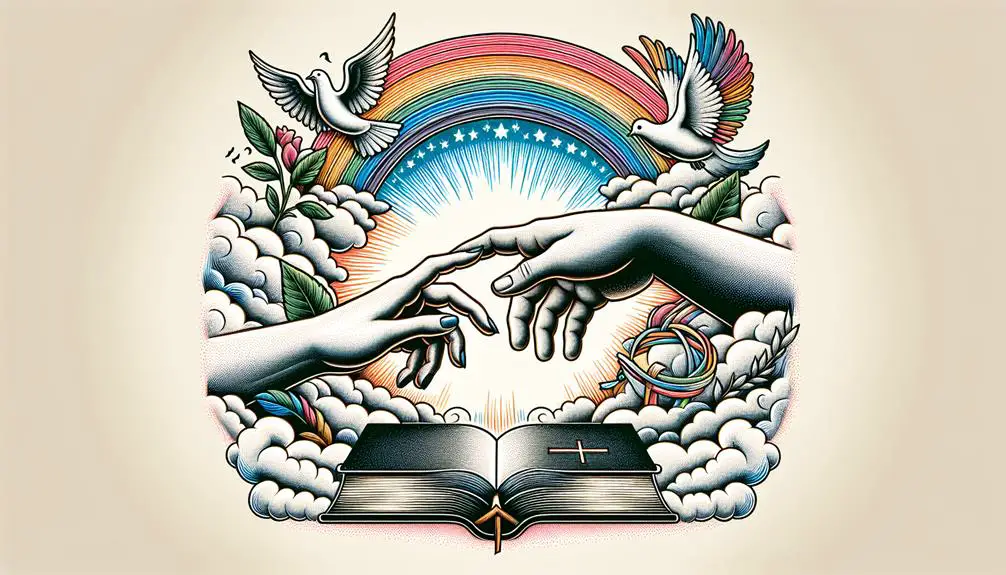Marvel at the deep symbolism of espousal in the Bible, uncovering ancient practices that shape modern views on spiritual commitments.

Espoused Definition in the Bible
As they say, 'The devil is in the details,' and when you explore the concept of espousal in the Bible, you'll find a rich tapestry of history, symbolism, and divine covenant that might just change your perspective on spiritual commitments.
The Bible doesn't just mention espousal in passing; it embeds it deeply within its narratives, offering layers of meaning that have evolved over centuries.
By understanding the historical context and the symbolism behind biblical espousal, you'll uncover insights into how these ancient practices influence modern interpretations and applications.
Let's embark on this journey together, and you'll discover why this topic remains relevant in today's discussions on faith and commitment.
Key Takeaways
- Espousal in the Bible reflects historical matrimonial customs, including strategic alliances and dowry exchanges.
- Biblical texts like Genesis 24 and Deuteronomy 22 highlight the importance and binding nature of espousal vows.
- Espousal serves as a metaphor for the sacred covenant between God and His people, emphasizing fidelity and commitment.
- Modern interpretations of biblical espousal aim to enrich faith communities, avoiding harmful stereotypes and fostering interfaith dialogue.
Historical Context of Espousal

To understand the concept of espousal in the Bible, it's crucial to delve into its historical context, where matrimonial customs and societal norms played pivotal roles. Espousal, essentially a formal engagement period, was heavily influenced by cultural norms and dowry practices of the time. You'd find that engagements weren't merely romantic decisions but strategic alliances between families, often cemented by dowry exchanges.
These dowry practices weren't just about transferring wealth or goods; they served as a form of security for the bride, ensuring her support in the unfortunate event of her husband's death or divorce. This intricate system underscored the economic and social dimensions of marital unions, revealing how deeply intertwined they were with the fabric of society.
Furthermore, cultural norms dictated the conduct of espousal, setting clear expectations for both parties involved. This period wasn't simply a countdown to the wedding; it was a crucial phase for families to negotiate terms, settle dowries, and solidify alliances. It's fascinating how these historical practices provide a foundation for understanding espousal's significance beyond its surface-level interpretation as mere pre-marital engagement.
Espousal in Biblical Texts

ARTICLE TITLE: Espoused Definition in the Bible
PREVIOUS SUBTOPIC: 'Historical Context of Espousal'
CURRENT SUBTOPIC: 'Espousal in Biblical Texts'
Having explored the historical context of espousal, let's now examine its portrayal and significance within biblical texts. You'll find that espousal in these sacred writings isn't just a casual mention; rather, it's deeply embedded with cultural practices and legal implications, reflecting the society of the time.
Here's a quick overview:
Reference |
Cultural Practice |
Legal Implication |
|---|---|---|
Genesis 24 |
Arranged marriages |
Binding contract |
Deuteronomy 22 |
Purity laws |
Penalties for breach of betrothal |
Matthew 1 |
Joseph and Mary's betrothal |
Righteous handling of espousal vows |
These examples highlight how espousal wasn't taken lightly. In Genesis 24, arranged marriages underscore the family's role in espousal, emphasizing the importance of lineage and alliances. Deuteronomy 22 outlines the legal ramifications for violating betrothal, reflecting its binding nature. Meanwhile, Matthew 1 offers a glimpse into the righteousness and integrity expected in handling espousal agreements, even under challenging circumstances.
Understanding these texts reveals the complex interplay between cultural norms and legal expectations surrounding espousal, offering a richer appreciation of its significance in biblical times.
Symbolism and Significance

While delving into the cultural practices and legal implications of espousal in biblical texts provides insight, understanding its symbolism and significance unveils deeper layers of meaning within these sacred narratives. The Bible frequently uses marital metaphors to depict the relationship between God and His people, illustrating a bond that isn't only legal but profoundly sacred and covenantal. These metaphors are rich with implications about loyalty, love, and commitment, elevating the concept of marriage beyond mere contractual agreement to a divine union.
Ceremonial customs surrounding espousal in biblical times were laden with symbolism. For instance, the act of a bridegroom leaving his home to fetch his bride mirrors the biblical theme of redemption, symbolizing a journey undertaken to reclaim something precious. The exchange of vows and symbols, such as rings or other tokens, signifies an unbreakable bond, a theme echoed throughout the biblical narrative in God's unwavering fidelity to His people.
Analyzing these elements sheds light on the multifaceted ways in which espousal reflects broader spiritual truths. It's not just about the joining of two individuals but about the intertwining of divine promises, human commitment, and the sacredness of covenantal relationships.
Espousal and Divine Covenant

Exploring the concept of espousal in biblical texts reveals its role as a profound metaphor for the divine covenant between God and His people. This metaphorical use of marriage rituals underscores the solemn and binding nature of the covenant, much like the vows exchanged in a wedding ceremony. You'll find that throughout the scriptures, espousal isn't just a casual reference but a deliberate illustration of the relationship dynamics between the divine and the human realms.
Delving deeper, you notice that covenant renewal ceremonies in the Bible often mirror aspects of ancient marriage customs. These rituals serve not only as reaffirmations of faith but also as reminders of the mutual commitments made. The analogy to marriage emphasizes the expected fidelity between God and His people, highlighting how breaches of this covenant mirror the pain and betrayal of an unfaithful spouse.
In this context, the espousal metaphor extends beyond a simple analogy, embedding itself into the very fabric of biblical narrative and theology. It serves as a constant reminder of the sacredness of the relationship between the Creator and His creation, urging a return to covenant fidelity and renewal of commitment. This intricate intertwining of marriage and covenant offers profound insights into understanding the depth of God's relationship with humanity, showcasing the espousal concept as a cornerstone of biblical interpretation and spiritual reflection.
Modern Interpretations and Applications

In contemporary theological discourse, scholars scrutinize the espousal metaphor's relevance and application to modern faith communities, revealing its enduring influence on understanding divine-human relationships. This metaphor, deeply embedded in biblical narratives, offers rich layers for exploration in today's context, where cultural relevance and ethical considerations are paramount.
- Cultural Relevance: You're tasked with interpreting ancient texts in a way that resonates with contemporary societal values, ensuring that the espousal metaphor enriches rather than alienates modern audiences.
- Ethical Considerations: It's crucial to navigate the metaphor's implications with sensitivity, avoiding interpretations that could reinforce harmful stereotypes or inequalities.
- Community Engagement: You'll find that applying this metaphor can foster a deeper sense of belonging and commitment within faith communities, mirroring the covenantal relationship it originally depicted.
- Interfaith Dialogue: This metaphor serves as a bridge in conversations between different religious traditions, highlighting shared values and fostering mutual respect.
- Educational Tool: In your role, you leverage the espousal metaphor as a compelling narrative device to engage learners of all ages, making abstract theological concepts more accessible and relatable.
Frequently Asked Questions
How Do Different Christian Denominations Interpret the Concept of Espousal Differently, and How Does This Affect Their Marriage Ceremonies?
You'll find that Christian denominations interpret espousal in ways that deeply influence their marriage rituals. Denomination traditions play a pivotal role, shaping ceremonies from vows to symbols of unity.
For example, Catholics emphasize sacramental aspects, while Protestants might focus on covenantal commitments. This divergence affects everything from pre-marital counseling requirements to the ceremony's structure.
Analyzing these variations offers insight into how theology and church practices interweave in defining matrimonial bonds.
Are There Any Notable Figures in the Bible Who Challenged or Reinterpreted the Traditional Concept of Espousal, and What Were Their Reasons?
Like a boat challenging the stormy sea, notable figures did indeed reinterpret traditional concepts of espousal. Joseph's dilemma, caught between law and love, showcases his internal battle, ultimately choosing compassion over condemnation.
Mary's courage, accepting an unconventional role, highlights her groundbreaking stance. These narratives analyze the complexities within relationships and societal norms, inviting a deeper understanding of faith, love, and the courage to defy expectations for a higher calling.
How Has the Concept of Espousal in the Bible Influenced Legal Definitions of Marriage and Engagement in Contemporary Societies Around the World?
You're looking at how legal definitions of marriage and engagement globally have been shaped by biblical concepts of espousal. Through legal reforms, societies have adapted these ancient norms, blending them with cultural adaptations to form today's laws.
This interplay reflects a complex mesh of historical values and modern legal frameworks, illustrating a direct influence from biblical teachings on contemporary legal systems, especially regarding marriage and engagement's contractual and societal roles.
In What Ways Have Feminist Theologians Critiqued or Re-Envisioned the Concept of Espousal Found in the Bible?
Feminist theologians have critically engaged with traditional interpretations, spotlighting how gender dynamics in biblical espousal narratives can perpetuate inequalities.
You'll find they've pushed for a theological reinterpretation that elevates mutual respect and partnership.
This approach doesn't just challenge dated norms but reimagines them in a contemporary context, offering fresh perspectives that align with modern values of equality and justice.
Their work is a testament to the dynamic, evolving nature of theological discourse.
Can the Concept of Espousal in the Bible Be Related to or Contrasted With Espousal Traditions in Other Major World Religions?
You can indeed relate or contrast the concept of espousal in major world religions with those in other traditions. By examining cultural rituals and the dynamics of interfaith marriages, you'll uncover rich insights.
These practices reveal how deeply embedded espousal traditions are within societal norms and religious teachings. Analyzing them provides a nuanced understanding of similarities and differences, reflecting the complex interplay between religion, culture, and personal identity in shaping espousal practices.
Conclusion
In essence, espousal in the biblical context serves as a profound testament to the sanctity of commitments, intertwining human relationships with divine covenant. It's a reminder that, as the adage goes, 'actions speak louder than words.'
Your understanding of biblical espousal transcends mere historical or symbolic interpretations; it calls for a deep reflection on the essence of devotion and fidelity. This exploration reveals its enduring relevance, urging modern readers to consider the weight of their own commitments in light of this sacred principle.



Sign up